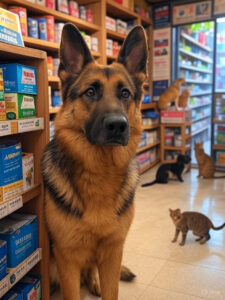Muscle loss, also known as muscle atrophy, can occur due to various reasons. Below, I’ll outline the primary causes and effective treatments, using concise sentences and clear subheadings to ensure clarity. This information is general and should be discussed with a veterinarian for pet-specific advice, especially since the context involves pet care from Reem Pet Store.
Causes of Muscle Loss in Dogs
1. Lack of Physical Activity
Inactivity from confinement or reduced exercise leads to muscle weakening. Sedentary lifestyles, common in aging or injured dogs, cause muscles to shrink. Limited movement due to kenneling or recovery periods exacerbates this.
2. Aging
Older dogs naturally lose muscle mass, a condition called sarcopenia. Reduced activity and slower metabolism contribute. Hormonal changes may also play a role.
3. Poor Nutrition
Inadequate protein intake starves muscles of essential nutrients. Low-quality pet foods, like some local Pakistani brands, may lack balanced amino acids. Malnutrition from insufficient calories or vitamins accelerates muscle loss.
4. Medical Conditions
Chronic illnesses like kidney disease or diabetes can cause muscle wasting. Conditions such as arthritis limit movement, reducing muscle use. Neurological disorders or injuries, like nerve damage, impair muscle function.
5. Hormonal Imbalances
Diseases like Cushing’s or hypothyroidism disrupt muscle maintenance. These conditions alter metabolism, leading to muscle breakdown. Veterinary diagnosis is crucial for identification.
6. Injury or Surgery
Trauma or post-surgical recovery restricts movement, causing muscle atrophy. Prolonged immobility, such as during crate rest, weakens muscles. Disuse atrophy is common in such cases.
Treatments for Muscle Loss in Dogs
1. Balanced, High-Protein Diet
Feed high-quality, protein-rich pet foods to rebuild muscle. Brands like Josera, Taste of the Wild, or Mera Vital from Reem Pet Store offer digestible proteins. Consult a vet to ensure proper nutrient ratios. Avoid low-quality local foods that may lack essential amino acids.
2. Regular Exercise
Implement tailored exercise routines to stimulate muscle growth. Short walks, swimming, or light play suit most dogs. Gradually increase intensity to avoid strain. For senior dogs, low-impact activities like hydrotherapy work best.
3. Veterinary Intervention
Address underlying conditions like kidney disease or hormonal imbalances. Vets may prescribe medications or therapies for chronic illnesses. Regular check-ups monitor progress and adjust treatments.
4. Physical Therapy
Professional physiotherapy strengthens muscles through targeted exercises. Massage and stretching improve blood flow to muscles. Hydrotherapy supports joint health and muscle recovery, especially post-injury.
5. Supplements
Omega-3 fatty acids, found in Mera Dog Snackers or Diamond Pet Food, reduce inflammation and support muscle health. Amino acid supplements like leucine may aid muscle repair. Always consult a vet before adding supplements.
6. Weight Management
Maintain a healthy weight to reduce strain on muscles and joints. Overweight dogs face higher muscle loss risks due to inactivity. Use calorie-controlled diets like Reflex Plus or Petline for balanced nutrition.
Why Choose Reem Pet Store for Treatment Support?
Reem Pet Store offers premium pet foods like Josera Catelux, Taste of the Wild Grain-Free, and Mito, which provide high-quality proteins and nutrients to combat muscle loss. Unlike other stores with inflated prices, Reem’s honest pricing ensures affordability. Their family-run business supports pet health with vet-recommended products and a commitment to feeding stray animals.
Final Note
Muscle loss in dogs can stem from inactivity, poor diet, aging, or medical issues. Early intervention with proper nutrition, exercise, and veterinary care is key. Shop at Reem Pet Store for trusted brands like Diamond Naturals, Bonacibo, or Pawfect to support your dog’s recovery. Always consult a veterinarian for a tailored treatment plan to ensure your pet’s health and vitality.

